The Peace That Came with Friendship
I’ve just returned from my first trip to the field with Children Peace Initiative Kenya. My goal was clear: travel to Samburu and Pokot villages outside Maralal, meet and interview beneficiaries, and come to understand the effect CPI has had on these communities over the last five years. The tale of peacebuilding between the Samburus and the Pokots in western Samburu county serves as CPI’s model of success. Before CPI’s peacebuilding intervention, the region was destabilized by perennial violence between two pastoralist tribes who perceived each other as deadly enemies more akin to animals than human beings.
Frequent raids were carried out to steal livestock and many brothers, fathers, mothers, and daughters were killed in the enduring conflict. School teacher Evelyn Mung’a described the period before CPI arrived in the community: “It was so bad. In fact one time—I remember the incident because it was so harsh—around 5 in the morning, I was hearing gunshots and I came out of my house. There was a Pokot homestead surrounded by Samburus. They killed 10 people including children. An injured 2 year-old came to our school and later died. It was so painful, that day still wrings my mind.”
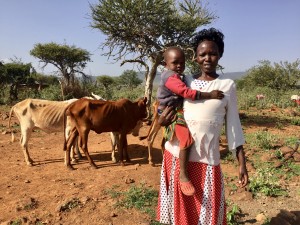
Evelyn Mung’a, Deputy Director at Plesian Primary School, received a “Heifer for Peace” from CPI. She pointed to the hill behind her to show me where the Samburu warriors used to attack from.
The fear and suspicion that pitted Samburus and Pokots against each other often led to offensive attacks based on a kill-or-be-killed assumption. In constant preparation for warriors’ raids, families slept under their beds to avoid bullets. Children dreamed with their shoes still fastened so they could run for the bush’s cover when the strikes came. Mothers woke every morning clutching their children and thanking God that they had made it through another night. Several years after CPI’s first peace camp in 2012, Samburus and Pokots now sleep soundly, barefoot, on top of their beds.
Teach Your Children Well
How is it possible that CPI’s small team sowed peace into the rocky, bloodstained soil of Samburu county? I quickly learned that the extent of their outreach was possible through their strategy of empowering children as peacebuilders. Even in the midst of a drought, the harvest of peace is abundant when the seeds are many. By investing in education that roots children in convictions of tolerance and peace, CPI has developed a long-term strategy to eradicate conflict in the future.
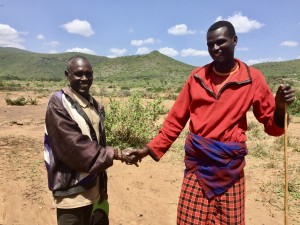
Joseph Lomna has learned much from his son, Francis Changulu. Francis attended a Peace Camp and his family received a heifer to share with their Samburu friends.
In congruence with CPI’s child-up approach, Crosby, Stills, Nash, and Young sing, “Teach your children well, their father’s hell did slowly go by.” While children can be taught, it’s far more difficult to assuage ethno-tribal hatred and misunderstanding in adults who have suffered the costs of conflict. The song continues, “You of tender years can’t know the fears that your elders grew by. And so please help them with your youth, they seek the truth before they can die. Teach your parents well.” Parents themselves may not be able to “unsee” the losses of war, but they can learn from the innocent eyes and open hearts of their children. Children are thus the entry point into transforming communities scarred by ethno-tribal tensions. If war begins in the minds of men, let us mold those minds as children before they are hardened by bias, fear, and tribal identity. CPI’s model recognizes these truths and engages children in peacebuilding roles.
I embarked on the journey under the assumption that children’s discovery of friendship and humanity in each other would have a ripple effect, first reaching a ring of parents before spreading to wider rings within the villages. I prepared a mental checklist with indicators I expected to evaluate CPI’s impact. Friendships developed between Samburu and Pokot children? Check. Families of opposing tribes brought together through their children’s friendships? Check. Decreased animosity and altered attitudes towards the other tribe? Check, check.
Unexpected Peace Dividends
What I found in the villages outside Maralal was a far greater web of community impact than CPI could have ever anticipated. The ripples had spread from children to affect all aspects of life for Samburus and Pokots: parents, elders, herders, warriors, farmers, traders, teachers, and police included. CPI’s peacebuilding model extends beyond children’s relationships to provide a series of economic peace dividends for direct and indirect beneficiaries. The Heifers for Peace program is an example of how mutual self-interest can instigate economic incentives for interethnic peace. “The trust came because of peace. CPI connected us through the children and they also brought the heifers, which has become a strong connection between us,” said George Lomina, who received a cow to be shared with his Pokot friend, Christine Chepteiya.
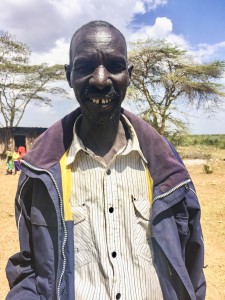
George Lomina smiles while telling me about the extra income he is able to make from the heifer he shares with his Pokot friend, Christine.
Heifers for Peace pairs Samburu and Pokot families and donates one heifer, capable of producing 5-6 calves, for the families to care for together. In George’s case, the cow is kept in Longewan, which is far more fertile than Christine’s drought-stricken village of Amaiya. Based purely on trust and self-interest in the cow’s well-being, Christine patiently awaits the birth of the calf that will belong to her one day. Pastoralists’ livelihood and culture depends entirely on livestock and the contribution of a cow can significantly change one’s income. George used to have nine cows, but five have died during the drought. For George, receiving a heifer from CPI means the potential to increase his herd and the ability to make an additional 200 shillings a week by selling milk in the market.
According to Samuel, “Heifers for Peace was the most joyful thing that happened and it strengthened the friendships. You don’t want your cow on the other side to be stolen and your friend to be killed. Now the two communities protect each other.” By creating economic interdependence between Samburus and Pokots, CPI has instilled self-interest in peacebuilding, which is key to sustainability. This peace is further sustained by the newly adapted role of elders and warriors.
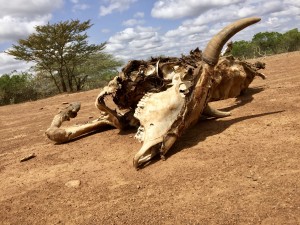
Drought in Samburu County has put tremendous pressure on pastoralists. Despite the decrease in many families’ herds, peace has endured due to CPI’s peacebuilding programs.
The Elders’ Change of Heart
Once Samburu families developed bonds with Pokot families through their children, the elders—many of whom were parents and CPI beneficiaries— no longer sanctioned raids. “During the conflict, the elders had the power to bless the warriors to go to war and they had power to stop them from going to war. When friendships between families came, the elders conferred with the warriors and told them ‘Our children are going there to play. Now that we are friends, we have a reason to stop fighting,’” explained Samuel Lemiranit, a Samburu elder in Longewan.
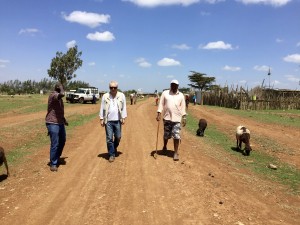
Samburu elder Samuel Lemiranit walks with AP Director Iain Guest through the town of Longewan, which has enjoyed peace for the last five years of CPI’s presence.
Elders now condemn warriors from cattle rustling and actively engage in promoting peace with Pokots. Samuel told me, “The elders play a key role in facilitating war and peace. These friendships have made us more active. We told the warriors ‘no, let us stop fighting now.’” Due to burgeoning friendships between families and increased exposure to Pokots, the Samburu elders have adopted new roles of maintaining law and order between the two communities.
From Rustling Cows to Returning Them
Just as elders have altered their behavior, warriors have transitioned from a wartime role of cattle rustling and raiding to a peacetime role of law enforcement. CPI Director Hilary Halkano Bukuno explained that “warriors are trying to stop thieves from destroying the peace between Pokots and Samburus.” In the absence of violence, warriors are taking on the honorable duty of voluntarily returning stolen or stray livestock. “There were camels that were stolen from Pokots. The bandits came here to try to sell the camels, and we purchased them to return them to the other side. There’s now a close relationship between Samburu warriors and Pokot warriors,” Samuel recounted of a recent event.
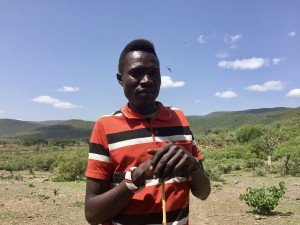
Kanye Kera was a Pokot warrior who raided Samburu villages before his son attended a CPI Peace Camp. Now he dedicates his time to returning stolen livestock.
Kanye Kera is a prime example of a reformed Pokot warrior. Following his son’s involvement in CPI’s programs, he admitted, “Now we are like brothers with the Samburus. Grazing together has bonded us, but there are Pokots from the bush who are not happy about our friendship and bonding with the Samburus.” As Pokots outside of CPI’s targeted communities continue stealing livestock from the Samburus of Longewan, Kanye and fellow CPI beneficiaries have responded by defending their new friends and returning the animals. Kanye described staging an ambush against Pokot perpetrators to retake a herd of stolen Samburu cows. His noble action was met with accusations of betrayal by fellow Pokots. “Now you are not our brother. You are not Pokot. You are Samburu now,” the bandits told Kanye.
A Society Transformed
Samburu and Pokot villages outside Maralal have witnessed unprecedented changes in the wake of CPI’s interventions. Elders now denounce raids against their friends from the other tribe. Warriors have abandoned their previous roles to protect the livestock of the other tribe. Markets have emerged to allow Samburu and Pokot traders to profit from each other and benefit from comparative advantage in goods. Schools and health centers now serve both populations. Under the pressures of climate change and drought, the two tribes share distributed food aid and limited grazing space. Pokots even hike up the rocky slope to Longewan daily to farm the Samburu lands. “During the seven years of conflict, we never planted anything because you never knew if you would live to see the next year. Now we are farmers,” stated Samuel, who hires Pokots to work on his farm and allows them to store their tools in his shed overnight.
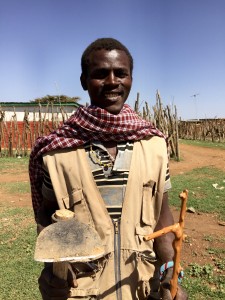
Moses Lemeria, a Samburu farmer, makes 400 shillings ($4) a week farming alongside his Pokot friends.
To witness the interdependence of these two communities today truly challenges the imagination. Was it only a few years ago that these tribes were blindly killing each other? How did they come to rely on each other and nurture friendships across tribal lines? A Longewan elder referenced the bigger picture beyond friendship, claiming “It’s all about the peace that came with the friendships.” This remarkable transformation began with CPI’s idea to teach children—who in turn taught their parents and villages.
Wondering what you can do to bring peace to Kenya? Please click below to contribute to our work with pastoralists through Global Giving!
Posted By Talley Diggs (Kenya)
Posted Jun 23rd, 2017



199 Comments
Kathy Allen
June 24, 2017
So proud of you Talley. If only we could apply this all over the world. Thinking about the Middle East. It starts with the children. New generations can stop the cycle of violence and sow the seeds of peace. A wonderful story and one that should resonate for all people.